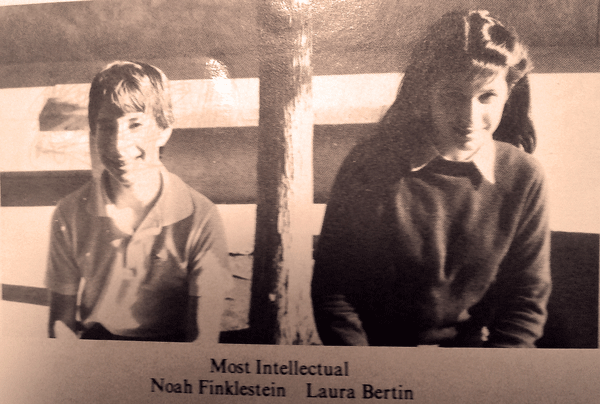That’s me in the picture. Eighth grade. I was voted Most Intellectual by my classmates. This title was part of a larger slate of superlatives: Most Likely to Succeed, Best Looking, Most Athletic, Prettiest Eyes, Best Smile, Class Clown. I wonder if these elections are still in practice today and if so, whether the categories have changed. Good clean fun or politically incorrect oppression? I can see current public opinion going either way.
The class voted one boy and one girl for each of the honors, or “honors” in my case. My posture in the picture speaks volumes: “Maybe if I lean a little more, I can lean myself out of the picture.”
Who was my counterpart? Noah Finkelstein. What’s so funny to me about this picture is how accurate our titles were. Noah and I are now both professors. Coincidentally, we are both professors at CU Boulder. I’m a marketing professor. He’s a physics professor, a world-renowned expert in physics education research.
I don’t see him all that often. The last time we got together was in 2013, when I visited him in his office to get his input about a new math class for our business students. More recently I encountered him in iTunes. He was a guest on the Teach Better podcast. I listened to it.
A few things struck me about his episode. First, he was funny. I couldn’t remember whether he was funny or not from forty years ago. Second, he sounded smart. Maybe that shouldn’t be such a surprise: he is, after all, a physics professor, not to mention one of the RSJ Intermediate School Class of 1982 Superlatives. Third, he is definitely more intellectual than me. From dictionary.com: an intellectual “places a high value on or pursues things of interest to. . .the more complex. . .fields of knowledge. . .especially on an abstract and general level.”
When I went to visit Noah about my math class in 2013, I explained that I wanted to develop a class that taught students skills that would be useful to them in jobs. For business students, that means mastering Excel and being able to combine mathematical building blocks to solve real problems. For example, finding a breakeven production quantity—-the quantity at which the predicted revenue equals the production cost—-even if there are volume discounts or other non-linearities in production costs. Students need to be able to walk and chew gum at the same time, understand the problem structure (walk) and build a spreadsheet to analyze it (chew gum).
I was very focused on having the class be useful. Noah pushed back on that: he wasn’t against useful, but enduring education is about developing “habits of mind,” too, even if course material is not immediately useful. I went away unconvinced, at least unconvinced that there was a tension between utility and more general critical thinking skills in our approach to the new course.
I heard an echo of that 2013 conversation in a remark Noah made in the first few minutes of the podcast. He raised a concern about the “raw utilitarianism of workforce development that is reigning in education right now.” I’m not sure exactly what is about this phrase that lends it a disapproving tone. I suppose the word “raw” doesn’t help. It seems decidedly intellectual to me to imply that workforce development is a problem. For my part, I say more power to raw utilitarianism, especially to the extent that it grabs the interest of and motivates students. That’s the anti-intellectual side of me. If we are sufficiently clever, though, we are delivering “on an abstract and general level” too. I haven’t left the intellectual camp entirely.
I guess I am still conflicted: the leaning kid in the picture.
P.S. I was also voted the Most Intellectual girl of my high school senior class. Alas. Noah had moved by then, so I don’t know if he won it at his new school.

